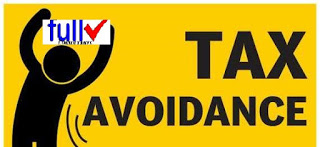PUBLIC WRONG VIEW OF TAX AVOIDANCE AND TAX EVASION
PUBLIC WRONG VIEW OF TAX AVOIDANCE AND TAX EVASION – Arguments for and against tax avoidance, why tax avoidance is good, why is tax avoidance unethical, tax avoidance morally wrong, tax avoidance and morality, why is tax evasion bad for the economy, tax avoidance legality vs morality, tax avoidance is immoral.
In addition – PUBLIC WRONG VIEW OF TAX AVOIDANCE AND TAX EVASION – attracts the following questions and comments; What’s wrong with tax avoidance? Public anger over tax avoidance is palpable, There’s nothing wrong with tax avoidance: we’re all forced to do it, While tax avoidance is perfectly legitimate, tax evasion is illegal. what is wrong with tax evasion? The Ethics of Tax Avoidance and Tax Evasion etc.
PUBLIC WRONG VIEW OF TAX AVOIDANCE AND TAX EVASION
In fact, Tax avoidance is an end-product of tax planning. Tax Panning is a combined efforts of both the taxpayer and the tax consultant in considering the taxes to be paid in future and taking appropriate measures to minimise them.
As a business man you would not want to pay too much taxes, but you do not know how to go about it.
The Way Out:
As a matter of fact, Complete Full Marks Consultants Limited (CFMC Ltd) will help you do this. Tax matter is a specialised matter which you as an ordinary person can’t just handle. You have to be trained on tax matters, and one of the ways to get good training on it is to always visit this blog and read the tax and related topics. There are so many of them in this blog. You could make comments through our comment platform or send in your questions through that.
PUBLIC WRONG VIEW OF TAX AVOIDANCE AND TAX EVASION
Therefore, in this article you will be made to know the difference between tax avoidance and tax evasion. I will go on also to give you the relevant information about each of them. Use our comment and news-letter platform to ask your questions in areas where you are confused and in fact on any tax matter. Click any of the social media buttons at the top right of this page to like us or follow us.
READ ALSO: Only 14M Nigerians pay Tax
What is meant by tax Avoidance?
Some say it is taking advantage of loopholes in the tax laws to reduce tax liability. But some of us do not see it as taking advantage of loopholes in the tax laws. We see it as taking experts actions necessary to reduce tax liabilities while obeying the tax laws. There are no loopholes in the tax laws.
In making good plans for taxes, you must take note of the following:
1. List of approved taxes and levies and due dates for payments, filling returns, filling objections where need arise,
2. Timing of fixed assets acquisition and disposal in view of claiming initial allowances, balancing adjustments, annual capital allowances, capital gain, roll-over relief, etc.
3. Mode of ownership of fixed assets; considering methods like Hire purchase, finance lease or operational lease etc.
4. Where to invest, considering tax havens,
5. Which sector to invest in with regard to sectoral tax incentives etc.,
6. Entity structure – multiple entity structure that favours having a holding company.
7. Ensure that there is a good accounting system in place. This will ensure that expenses are properly recorded and not over bloated, that incomes are adequately recorded and not understated, and that tax allowable expenses and tax incentives are claimed.
8. And Others.
READ ALSO: TAX INCENTIVES IN NIGERIA ENCOURAGES INVESTMENTS
When you are taking the above listed steps you will consider yourself as one trying to minimise your tax liability, and that is tax avoidance. Tax avoidance is taking legal and appropriate steps in tax related matters to avoid paying more tax than is necessary. It means taking legal steps to minimise your tax liabilities.
PUBLIC WRONG VIEW OF TAX AVOIDANCE AND TAX EVASION
Tax evasions is the opposite of tax avoidance. It is like taking reckless action to reduce your tax liability by force. Tax evasion is a criminal act. Actions that qualify for this include:
- Deliberate misrepresentation of material facts,.
- Deliberate Hiding of relevant documents.
- Deliberately Not maintaining complete records of all the transactions.
- Deliberately Making false statements etc. etc
Tax evasion as an illegal action will land you in the court for criminal proceedings and if convicted both you, your business and your officers who help you in doing that will be punished. I hope you know the implication of being convicted as a criminal? That alone will deny you many rights and privileges in Nigeria. It is necessary that you avoid tax evasion. It is simple. Get a
tax consultant. It does not cost much. The consultant will help you:
1. Avoid taxes
2. Avoid tax evasion
3. Liaise with the tax authorities .
4. Get relevant tax documents like tax clearance certificates’
5. Be a patriotic citizen by paying your taxes.
6. Qualify to do business in Nigeria.
What is the difference between tax evasion and tax avoidance
You may have been practising tax evasion thinking it is tax avoidance, but now you know the difference between the two.
Tax avoidance is popularly defined as the legitimate minimisation of taxes, using methods approved by the Federal Inland Revenue Service (FIRS). Businesses avoid taxes by taking all legitimate deductions and by sheltering income from taxes by setting up employee retirement plans and other means, all legal and under the Internal Revenue Code or state tax codes. I need to let you know that where your tax avoidance processes leaves you with non-taxable income or loss or tax payable far less than what is obtained in your industry the FIRS will not agree with you. That could attract tax audit. My dear to avoid getting into trouble with FIRS, you need us to arrange your tax matters.
While Tax evasion, on the other hand, is defined as the illegal practice of not paying taxes, by not reporting income, reporting expenses not legally allowed, or by not paying taxes owed.
PUBLIC WRONG VIEW OF TAX AVOIDANCE AND TAX EVASION
Tax evasion is most commonly thought of in relation to income taxes only, but this is not so. Tax evasion can be practised by businesses on state sales taxes and on employment taxes. This means that tax evasion can be practised on all the taxes a business owes. You know that when you deduct P.A.Y.E from your workers payroll or with-hold tax from a supplier and fail to remit complete sum or do not pay as at when due or did not pay at all, you are committing a criminal offence.
I know that many of you don’t know how to handle these matters, but that is why you should contact us today.
Deacon Anekperechi Nworgu, a seasoned economist who transitioned into a chartered accountant, auditor, tax practitioner, and business consultant, brings with him a wealth of industry expertise spanning over 37 years.





